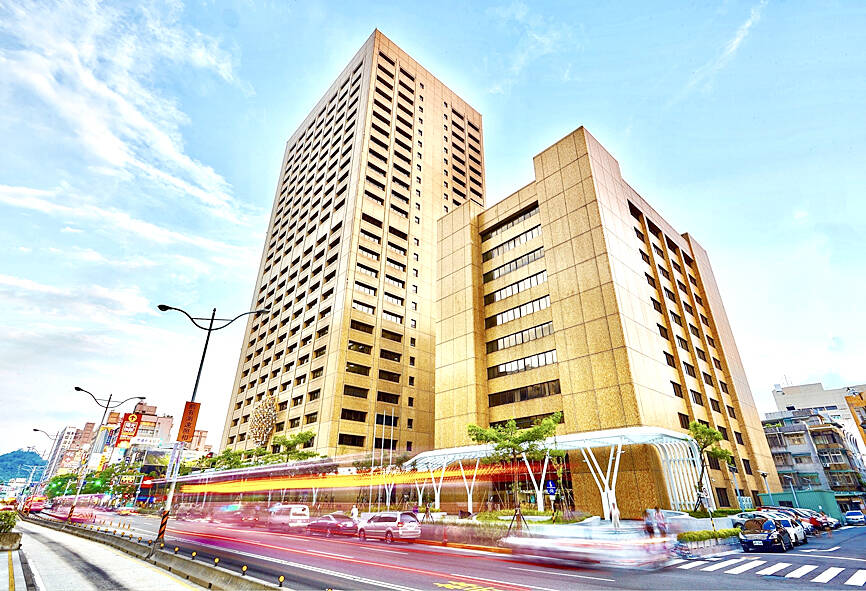Taiwan Power Co’s (Taipower) 40-year-old headquarters in Taipei is the first eco-friendly building that is at least 100m tall in Taiwan, the company said on Friday, touting renovations from 2017 to 2020.
In 2017, Taipower installed active magnetic bearing compressors developed by the Industrial Technology Research Institute for its air-conditioning system.
The compressors use 900 megawatt-hours less power per year than traditional compressors, whose gears are prone to friction, leading to loss of compressor momentum, Taipower said.

Photo courtesy of Taiwan Power Co
The company also installed precision cooling technologies for its server room and data centers, which together accounted for about 20 percent of the building’s power consumption due to the need for constant air conditioning to keep computers cool, it said.
The technology has halved the power use in its server rooms and data centers, it said, adding that compared with 2016, it has conserved 700MWh per year.
The upgrades in 2018 were recognized by the US Green Building Certification Leadership in Energy and Environmental Design, which gave the headquarters its platinum certification — its highest honor — for operations and maintenance of an existing building.
Last year, automated air-conditioning — which responds to temperature, humidity and carbon dioxide levels — was installed, Taipower engineer Chiu Yung-tang (邱泳棠) said.
The automated system has allowed the company to conserve 300MWh per year, Chiu said.
The building’s water recycling system captures rainwater and condensation from the air-conditioning system to water plants or flush toilets, Taipower said.
It refitted the restrooms with water-efficient toilets, which slashed water consumption by about 30 percent, it said, adding that the company this year began collecting water from its central kitchen.
The company has conserved up to 15,000 tonnes of water since 2018, enough for one of its water-efficient toilets to be flushed 2.52 million times, it said.

Trips for more than 100,000 international and domestic air travelers could be disrupted as China launches a military exercise around Taiwan today, Taiwan’s Civil Aviation Administration (CAA) said yesterday. The exercise could affect nearly 900 flights scheduled to enter the Taipei Flight Information Region (FIR) during the exercise window, it added. A notice issued by the Chinese Civil Aviation Administration showed there would be seven temporary zones around the Taiwan Strait which would be used for live-fire exercises, lasting from 8am to 6pm today. All aircraft are prohibited from entering during exercise, it says. Taipei FIR has 14 international air routes and

Taiwan lacks effective and cost-efficient armaments to intercept rockets, making the planned “T-Dome” interception system necessary, two experts said on Tuesday. The concerns were raised after China’s military fired two waves of rockets during live-fire drills around Taiwan on Tuesday, part of two-day exercises code-named “Justice Mission 2025.” The first wave involved 17 rockets launched at 9am from Pingtan in China’s Fujian Province, according to Lieutenant General Hsieh Jih-sheng (謝日升) of the Office of the Deputy Chief of the General Staff for Intelligence at the Ministry of National Defense. Those rockets landed 70 nautical miles (129.6km) northeast of Keelung without flying over Taiwan,

The Ministry of National Defense (MND) today released images of the military tracking China’s People's Liberation Army (PLA) movements during the latest round of Chinese drills around Taiwan. The PLA began "Justice Mission 2025" drills today, carrying out live-fire drills, simulated strikes on land and maritime targets, and exercises to blockade the nation's main ports. The exercises are to continue tomorrow, with the PLA announcing sea and air space restrictions for five zones around Taiwan for 10 hours starting from 8:30am. The ministry today released images showing a Chinese J-16 fighter jet tracked by a F-16V Block 20 jet and the

City buses in Taipei and New Taipei City, as well as the Taipei MRT, would on Saturday begin accepting QR code payments from five electronic payment providers, the Taipei Department of Transportation said yesterday. The new option would allow passengers to use the “transportation QR code” feature from EasyWallet, iPass Money, iCash Pay, Jkopay or PXPay Plus. Passengers should open their preferred electronic payment app, select the “transportation code” — not the regular payment code — unlock it, and scan the code at ticket readers or gates, General Planning Division Director-General Liu Kuo-chu (劉國著) said. People should move through the